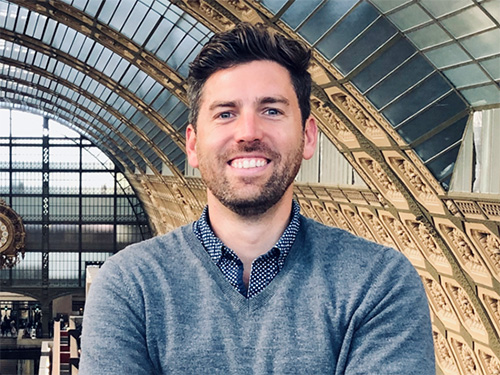Featured Customer: Kyle Bentz, Ph.D.

It was our pleasure to interview Dr. Kyle Bentz, who is currently pursuing postdoctoral research in polymer chemistry. First exposed to SEC-MALS as a graduate student, Kyle has acquired a deep appreciation for the benefits Wyatt instruments bring to polymer research, and, in typical California native fashion, makes no bones about it! Kyle, we appreciate your enthusiasm and thank you for your candid responses.
Please tell us about your background: where you grew up, what you studied and the field you chose.
From a very young age I knew I wanted to study math or science, and I thank my parents for instilling in me that thirst for knowledge, but I think the specific choice of chemistry was a rather serendipitous one.
I’ve been lucky to call California home for most of my life. I grew up in San Jose and obtained my B.S. and M.S. from California Polytechnic State University in San Luis Obispo (commonly known as just ‘Cal Poly’), in polymer chemistry. At Cal Poly I was incredibly fortunate to work with Professor Phil Costanzo, who steered me towards pursing a Ph.D. under Professor Dan Savin at the University of Florida (go Gators!), at the Butler Polymer Research Labs.
I am currently a postdoc back in California, at UC San Diego in Professor Seth Cohen’s lab. From Phil, to Dan, and now with Seth, I have been absolutely blessed to have three of the best mentors, and I am deeply grateful for the guidance they have given me.
What kind of research are you currently pursuing?
Prior to joining Prof. Cohen’s lab, his group was beginning to work on a fascinating system of polymers which they termed ‘polyMOFs.’ In these polyMOF systems, polymers containing metal-binding ligands are complexed with metal clusters and are folded into highly crystalline, porous, metal-organic frameworks. It’s truly remarkable that an amorphous polymer can be converted into such a highly ordered structure as a MOF. I thought these polyMOFs were incredible, and I was hooked. Joining Seth’s group has been one of the best decisions of my professional career — it has been an absolute pleasure to be part of both the group and the research we work on!
In what context did you first learn about light scattering and Wyatt instruments?
Prof. Dan Savin was the person who introduced me to light scattering. One of the first things Dan loves to show anyone is his light scattering setup. As an incoming Ph.D. student with no previous light scattering experience, I gave Dan a blank stare! But in the years with Dan I began to really appreciate the power and the beauty of light scattering. It is such a simple concept, yet deeply powerful, and Dan has been the greatest teacher I have ever had the privilege of learning from.
How does your research benefit from Wyatt instruments?
While I was aware that Wyatt Technology is one of the top manufacturers of light scattering instruments, I had never had one in my own lab. When Seth approached me with an opportunity to write a grant to buy instrumentation, I knew right away a Wyatt-equipped SEC could help our research the most!
We have been using our DAWN®, ViscoStar® and Optilab® for almost a year now, and we feel like we are just scratching the surface of the capabilities of our instrument. Obtaining information about absolute molecular weights, radii of gyration, and block polymer compositions has allowed us to expand our research and dig deeper into the important questions of our research without having to worry about the accuracy of our data and if our interpretations are correct.

SEC-MALS has been invaluable, as we frequently synthesize polymers that have unusual architectures and chemical compositions; relying on polymer standards and calibration curves is just not feasible.
